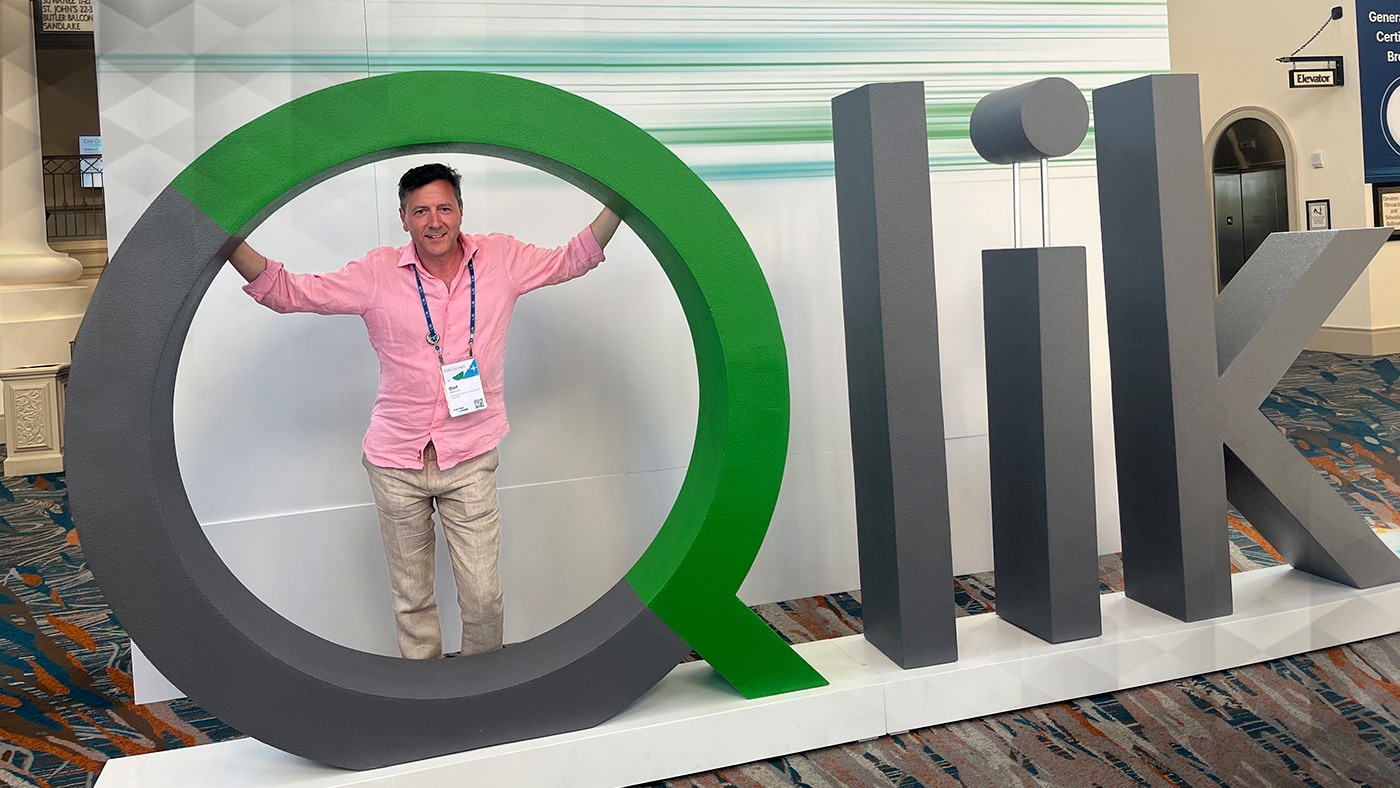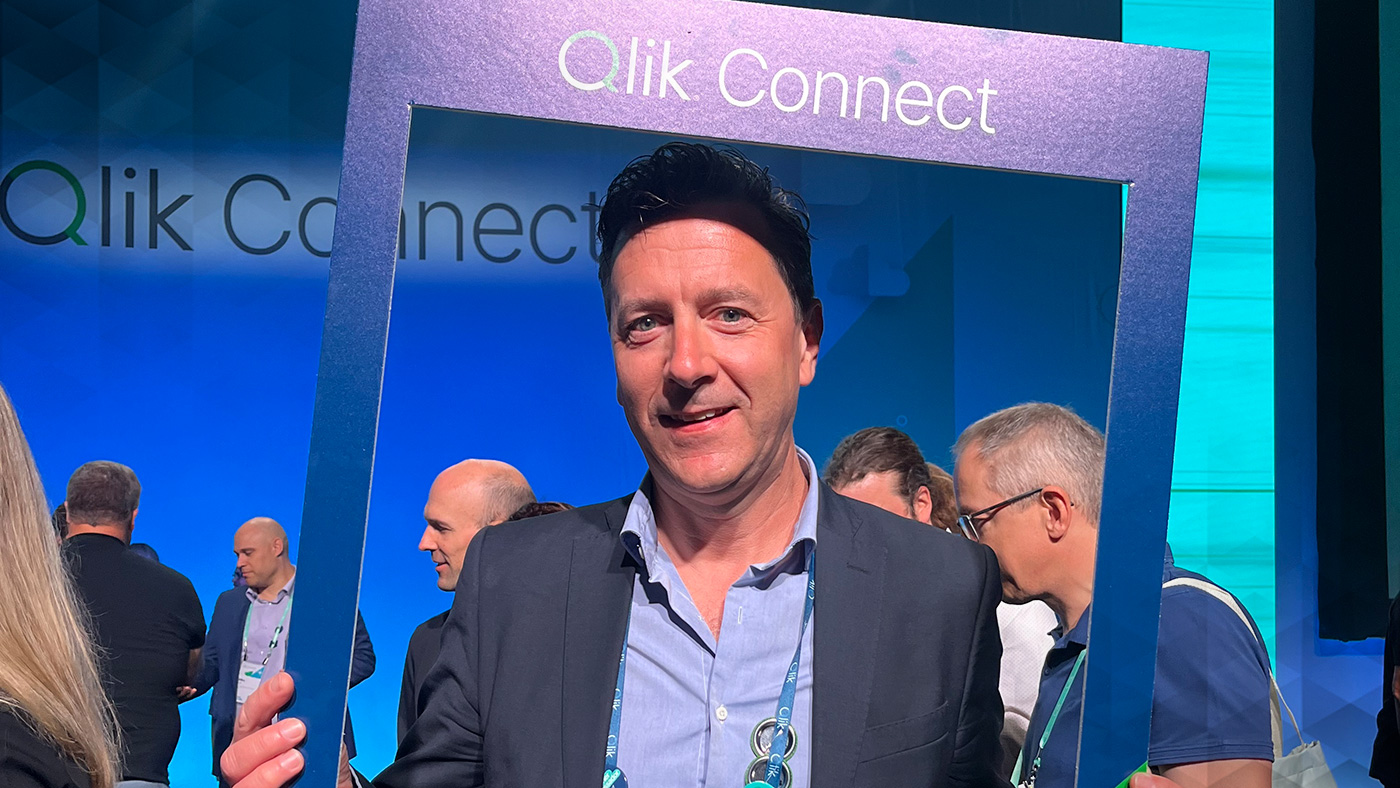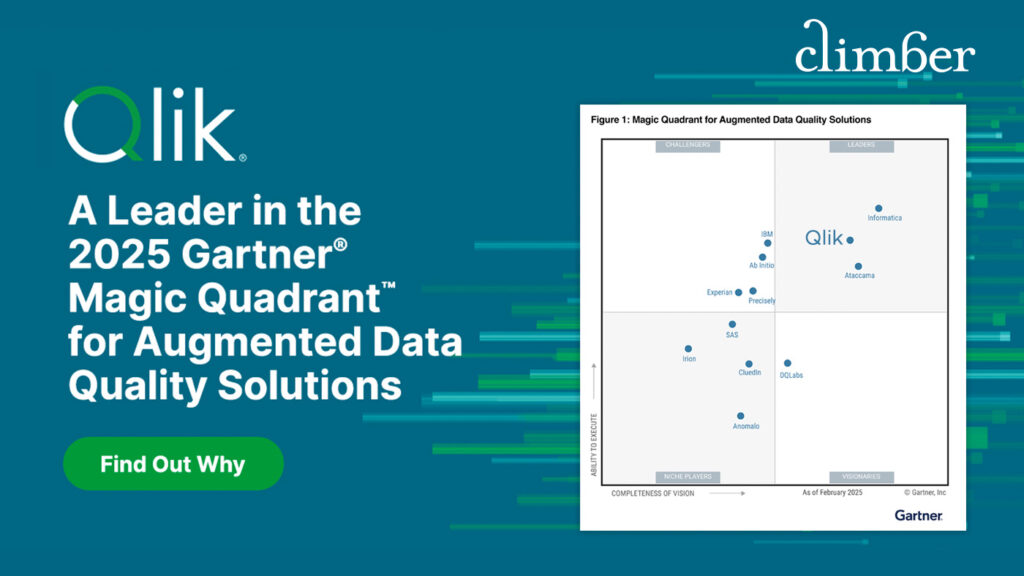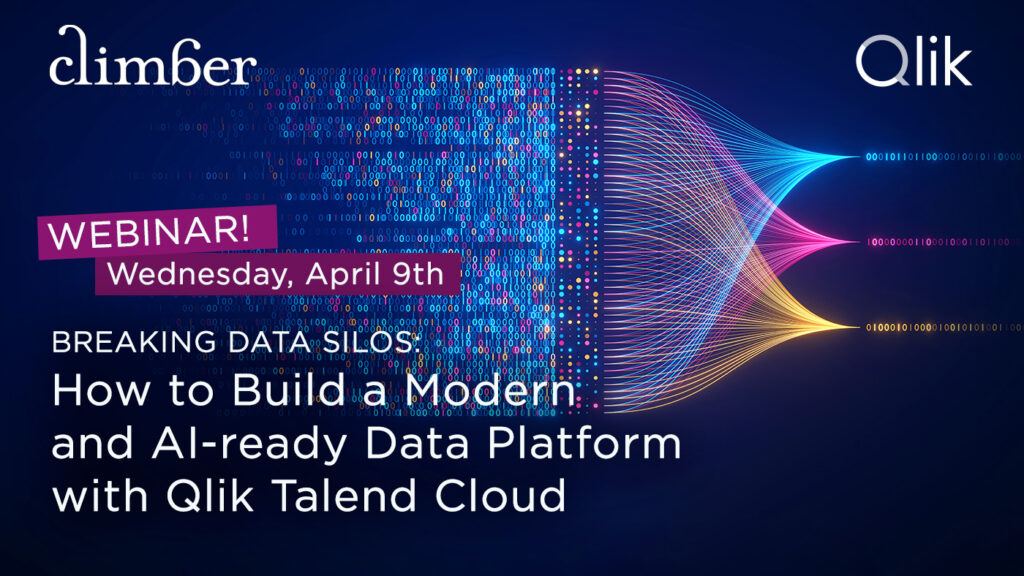
– CLIMBER BLOG –
What was new at Qlik Connect?
A couple of weeks after returning home from Qlik Connect in Orlando, it’s time to summarise all the impressions from the conference.
The market message has been shifting for a while from talking about BI (Business Intelligence) to talking about Analytics in general, including Machine Learning and AI. Following the explosion of Generative AI with OpenAI and ChatGPT this has accelerated further and Qlik proudly introduced the acquisition of Kyndi early 2024.
All of this influenced the keynote and many breakout sessions this year, and the AI messaging can be divided into three areas:
- AI assisted insights
- AI assisted development
- Prepare your data for AI
Two large releases: Qlik Answers and Qlik Talend Cloud
Qlik Answers is a turnkey product for leveraging AI and LLM (Large Language Models) in a controlled way. Connect Qlik Answers to your document storage and within hours you can post questions and get answers in real time from all your documents (PDF, PowerPoint, Word, etc.). With Qlik Answers you always get a reference to the source of the answer so you easily can decide whether the answer is trustworthy or not. This is key to reliable analytics.
Qlik Answers is based on RAG (Retrieval-Augmented Generation) where you combine the LLM’s general knowledge with your documents’ data, without your data being available to others using the same LLM. The information in your documents never leaves your Qlik Answers Tenant.
Qlik Answers will be available on July 17th.
Qlik Talend Cloud is not something completely new, but the result of hard work over several years incorporating all the acquisitions within the Data Integration area into Qlik Cloud. Starting with Podium Data, Attunity, Talend, etc. Qlik now has a really good technical offering for Data Integration and Automation of DWH/DL creation as an integrated part of Qlik Cloud.
Now the latest is that you within Qlik Talend Cloud can use the graphical data flow designer from Talend, but also a new feature to generate your SQL code from a text, describing what you want to do. The product also includes the data quality components and new blocks for transforming data into vector databases to be used by LLMs and RAG AI. This is part of the messaging around preparing data for AI.

Mike Capone, CEO of Qlik, here together with Olof Malmström, BI Manager at Climber.

What is happening in Qlik Sense?
Not everything at Qlik Connect was about AI, there’s a lot going on in traditional BI too.
Qlik Sense users will notice a new navigation menu. All the navigation will be moved to the left-hand side, where your sheets can be organised into groups.
The new extension objects – Pivot Table/Straight Table/Layout Container – are improved further and in Qlik Cloud Analytics you see improvements almost weekly:
- The Pivot Table will get a chart exploration menu where the user can select fields and change the pivoting without having to edit the object.
- The Layout Container’s freedom of design will hopefully also be available as an option directly on the sheets.
Styling options are added to all objects and the Copy/Paste Style is a long-sought improvement.
Qlik Sense has collaboration on the script development, later this year they will add collaboration and sheet development. When co-developing on sheets, you will see which objects the other developer is currently working with, in a way that is similar to how you can collaborate in Microsoft Office. An implication of this will be that a sheet no longer has to be private to be edited in Qlik Cloud.
On the back-end they are finally adding folder structures in Spaces. I really hope they improve the way you delete files in a space as well.
One of the biggest changes to Qlik Sense is the ways you can add data to applications. They are introducing a new regime for that with three options; Scripting, Single Table, and a new No-code editor:
- Table (Qlik Cloud only) will use the interface that Talend has for creating recipes for cleansing data. This is initially intended for simple/single table use cases but I see the potential for using this in any application.
- No-code is the implementation of the Talend Data Flow editor into Qlik Sense where it will generate Qlik Scripts. As a replacement of the old no code “bubbles” I think this is really interesting also for the advanced developers. I’m a bit concerned though, about how optimised the load scripts will be? They are releasing this later this year so we need to wait a bit to see.
- Scripting will remain pretty much the same as today, but they are adding support for script files (qvs) for reuse of scripts between different applications. The implementation is really cool as it will show the qvs script inline with the code in the script editor of the application calling the script file. This will make debugging so much easier.
Qlik Cloud Reporting
The big news are first the Pixel Perfect Report Editor they are working on that will be great for any report that is customer facing.
Second is the on-demand functionality for Tabular Reporting where the users will be able to make selections and get a report based on the selected data.
Qlik AutoML
Qlik AutoML will get added support for evaluating your models without having to deploy them to Qlik Sense first. This is done by embedding a Qlik Sense application directly into the AutoML front-end where you can compare the performance of models and drill down into specific features.
Platform Management
Reload task chaining, which has been missing in Qlik Cloud – unless you use Automations for it – will be added in a really nice visual manner. They will not be automations, but can be converted to an automation if you need added functionality in the task chain such as calling other systems, etc. A task chain reload will not count against your automation quota.
Controlling what a user can do in the Cloud platform will be more granular as they are introducing Scopes. Currently the only available scope is whether a user can download data from a chart in the applications. The tenant admin will be able to edit the user default and new scopes will not be automatically added for all users.
Talend Fabric
Talend Fabric has got a complete graphical workover to gain a modern look and feel.
On the feature side, the biggest addition is the new blocks for preparing data for LLMs and GenAI – the same addition that is also available in Qlik Talend Cloud.
Summary
In summary, Qlik Connect was really good this year and if the feeling previous years has been more of a “marketing messaging” on what Qlik wanted to do, this year’s messages are “market ready” or really close to be released.
Of the things not yet released, I’m most excited about trying out Qlik Answers and the No-Code scripting in Qlik Sense. And yes, the release of folders in spaces and task chaining are also on my top list.
The future looks bright for all Qlik lovers.

QLIK PARTNER AMBASSADOR
OLOF MALMSTRÖM
Business Intelligence Manager at Climber
Olof Malmström has a background in Mechanical Engineering and Production Management, and has worked as a Business Consultant and Project Manager for various industries such as Telecom, Manufacturing, Logistics, and Finance. Olof is passionate about how information technology can be used to analyse and optimise the processes and work organisation. He is also a certified Vizlib Legends Gen II and Qlik Partner Ambassador, which demonstrates his proficiency and recognition in data visualisation and analytics.

Any questions? Contact us!
Olof Malmström
BI Manager
olof.malmstrom@climber.se
+46 73 443 48 50
Stef Comello
Managing Director
stef.comello@climber.nl
+31 6 81 78 98 97
Nieuws

The Data Literacy Imperative – Why your business can’t afford to ignore it
A recent Gartner report ranks poor data literacy among the top five barriers to the success of data and analytics initiatives. Discover strategies to bridge the data literacy gap and empower your team to make informed, data-driven decisions.
>> Read more
Qlik a Leader in the 2025 Gartner Magic Quadrant for Augmented Data Quality Solutions
Gartner has published the 2025 Magic Quadrant for Augmented Data Quality Solutions. After evaluating 12 top vendors, they have once again named Qlik a Leader—marking the sixth time!
>> Download the report
Breaking Data Silos: How to Build a Modern and AI-ready Data Platform with Qlik Talend Cloud
Want to be able to respond faster to business challenges and foster a data-driven culture? Then join this webinar to learn how Qlik Talend Cloud can help you reduce the complexity of your data architecture.
>> Register now!
